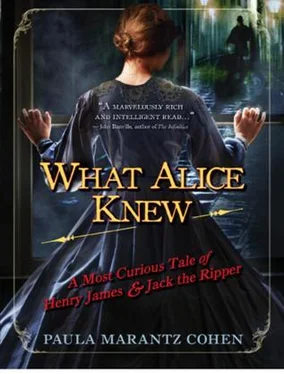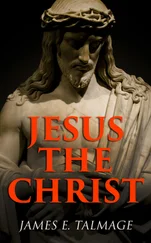Henry opened his eyes with a start. He had dozed over his ices, and he now saw that the table had been cleared. A few disorderly souls were loitering in the corner of the room, but the other guests had already taken their leave and dispersed into the night.
He rose and made his way unsteadily to the side door. His stomach had begun to rumble loudly, making him eager to exit the premises as quickly as he could.
Gosse’s manservant opened the side door at Henry’s request (but wasn’t Gosse’s man portly, while this one was spindly and with an insinuating eye?).
“Pressed for time,” he muttered as he stumbled out. “Relay thanks to the host—or hostess.”
Did Gosse’s man wink at him? Servants were getting cheeky these days. His own, though not entirely reliable, were not cheeky—at least he didn’t think so.
He moved quickly out of sight of the smirking manservant. He would find a hansom cab to take him home, but first he would walk, to clear his mind and settle his stomach. He should never have eaten the oysters.
He began moving briskly, in itself a novelty, since he was generally slow and sedentary, at his desk writing or driving about with women, but pains had erupted in his stomach, inspiring an urge to quicken his pace.
What if he had to—? Why had he not remained inside, where he could have—?
Perhaps he would vomit. That would be preferable—the lesser of evils, so to speak. The reality of his physical being, that whole unseemly apparatus of human plumbing, pressed itself on his consciousness. He felt a piercing pain in his abdomen that put him in mind of the stabbings discussed over dinner. Those women in the East End, their bowels ripped open, were horrible to think about. Yet now he must think about bowels, as he felt the pain ripping him from the inside. Was all suffering the same, indigestion as intense as the cut of a knife? The body was the great leveler. A thought to be pondered, though not now.
He would have to rid himself of the contents of his stomach; the certainty of this gripped him. He looked around at the well-appointed houses and neatly swept stoops he was passing. If he were in Mayfair, he might find his way to St. James Park, where he could locate a spot behind the shrubbery to do his business. The prospect of relieving himself, unseemly though it was, made him walk faster, and soon he could see that he had left the manicured streets and entered a new and unfamiliar area.
There was no greenery here. He had not been in Mayfair, perhaps, but in Chelsea or Bloomsbury, which abutted less pleasant parts of the city. Indeed, he was walking on a street that had little to recommend it. The lamps were fewer, and the curbs were mostly piles of rubble. What he could see of the houses were low, mean structures, their shutters broken, with little show of light inside. There was more movement on the street, however, though not festive movement; figures skulked and jostled up against him. He could not make them out but did not like the look of them.
He became aware of foul odors emanating from the pavement. Garbage was strewn about, and he stumbled over trash, his foot landing squarely in a pile of offal. The stench wafted up to his nostrils and made his stomach turn over more violently. He realized, to his horror, that his bladder had leaked, and the front of his trousers was wet. Disgust at his own person took hold; he was at the mercy of his body. A greater awareness then gripped him: he was at the mercy of his surroundings as well. He glanced at the low buildings and skulking figures and then at the narrow, trash-strewn streets, hoping to hail a carriage, but no vehicle was in sight. He had always sought control, in his life and his writing, but here he was, suddenly alone in a strange neighborhood, his mind clouded by wine, the figures around him alien and threatening. The sense of exposure, the sort of quivering vulnerability that he had always sought to avoid, swept over him, causing him to shudder violently.“Fine gentleman on an errand,” he heard someone call out. “What’s yer hurry?”
He ought to slow down. He was drawing attention to himself, walking so fast. But he couldn’t. The stabs of pain in his abdomen were intense and the waves of nausea coming more quickly.
These people must hate him, he thought, lowering his head. Wasn’t he portly and prosperous looking? Why shouldn’t they want to rob him, or worse, take a knife and cut into his soft belly? What had they to lose? If only he felt more like himself, he could show his authority in his bearing and, if necessary, his speech; these people were cowed by authority. But in his present state, he could not walk properly or speak or even think about anything but the terrible uproar inside him.
“Don’t run away, Mister.” A woman’s face, bloated with drink and garishly painted, appeared in front of him. Despite the cold, she was wearing practically nothing, her breasts pushed up like mottled melons from a tattered corset. He tried to shove her aside, but she held tight to both his arms, and her face and body, rancid with the odor of sex and sweat, pressed up against him.
“No,” he muttered, “not interested.”
“I kin make you interested, sir; just you gi’ me a second.” She rubbed against him forcibly, and with the pressure on his belly, he felt a lurch of nausea that caused him to retch, spilling the contents of his stomach—oysters, sweetbreads, the lot of it—on to her breasts.
The woman jumped back with a shriek. “Pig! Filthy pig! Look what he done, puking his dinner on me! Fine gentleman, got me filthy with his puke!”
People on the street turned around to look. Henry tried to move away but felt the woman block his passage, continuing to scream and point, the colorful stew of his vomit dripping from her front.
A man with a cap pulled low over his ears appeared, elbowed the shrieking woman aside, grabbed Henry by the arm, and pushed him to the ground. He felt the mud and gravel against his cheek as he lay facedown on the pavement, waves of nausea surging through him. The man with the cap tried to get into his pockets, and instinctively, Henry clutched the watch chain that had been his father’s, holding it close to his body and refusing to be turned, as he continued to retch onto the pavement. His body was in such a state of upheaval, under assault from without and from within, that his only thought was that this, certainly, must be the end of his mortal life.
Out of nowhere, a voice cut through the din. He could not make out the words, but he could hear the manner of locution: a gentleman’s voice, refined but forceful. With it, the chaos in which he had been engulfed receded. The woman’s screaming ceased; the hands that had been pulling at his jacket loosened and let go. He was helped miraculously to his feet and given a handkerchief to wipe his mouth. The door of a hansom cab was opened; he was handed in and asked his address; money was passed to the driver.
The next thing he knew, he was in front of his flat in Kensington. The uproar in his bowels had begun to subside, and his head, though it ached badly, had begun to clear. He staggered from the carriage, the Good Samaritan’s handkerchief still clasped in his hand. Through the haze of his returning consciousness, he noted that it was of very good cambric and wafted a faint scent of lavender.
A young man made a clattering entrance into the small, airless room in Boylston Hall where Professor William James had just finished a lecture on English philosophy (Locke, Berkeley, Hume) at Harvard College in Cambridge, Massachusetts. The young man’s tie was askew, and a light sweat had formed on his brow, evidence that he had been climbing up and down stairs looking for Professor James, whose academic interests had shifted so often over the past few years that no one seemed to know where in the Old Yard he could be found.
Читать дальше












